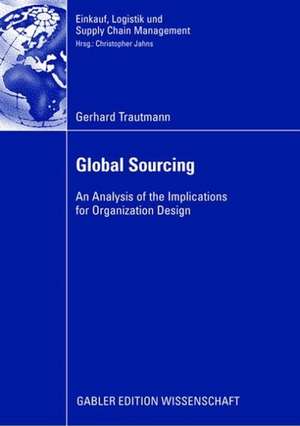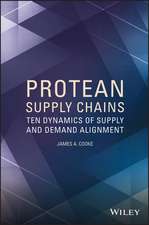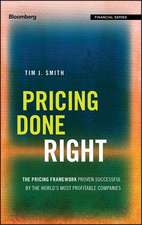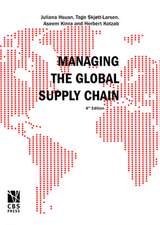Global Sourcing: An Analysis of the Implications for Organization Design: Einkauf, Logistik und Supply Chain Management
Autor Gerhard Trautmann Cuvânt înainte de Prof. Dr. Christopher Jahnsde Limba Germană Paperback – 29 sep 2008
Din seria Einkauf, Logistik und Supply Chain Management
- 15%
 Preț: 441.83 lei
Preț: 441.83 lei - 15%
 Preț: 442.98 lei
Preț: 442.98 lei - 15%
 Preț: 442.48 lei
Preț: 442.48 lei - 15%
 Preț: 472.04 lei
Preț: 472.04 lei -
 Preț: 388.90 lei
Preț: 388.90 lei - 15%
 Preț: 438.40 lei
Preț: 438.40 lei -
 Preț: 384.31 lei
Preț: 384.31 lei -
 Preț: 377.73 lei
Preț: 377.73 lei -
 Preț: 392.97 lei
Preț: 392.97 lei -
 Preț: 384.31 lei
Preț: 384.31 lei - 15%
 Preț: 637.13 lei
Preț: 637.13 lei - 15%
 Preț: 638.43 lei
Preț: 638.43 lei -
 Preț: 384.48 lei
Preț: 384.48 lei - 15%
 Preț: 470.72 lei
Preț: 470.72 lei - 15%
 Preț: 439.89 lei
Preț: 439.89 lei - 15%
 Preț: 440.02 lei
Preț: 440.02 lei - 15%
 Preț: 469.74 lei
Preț: 469.74 lei -
 Preț: 382.18 lei
Preț: 382.18 lei
Preț: 368.85 lei
Nou
Puncte Express: 553
Preț estimativ în valută:
70.58€ • 73.88$ • 58.74£
70.58€ • 73.88$ • 58.74£
Carte disponibilă
Livrare economică 05-11 martie
Livrare express 22-28 februarie pentru 46.75 lei
Preluare comenzi: 021 569.72.76
Specificații
ISBN-13: 9783834912688
ISBN-10: 3834912689
Pagini: 132
Ilustrații: XVII, 132 S.
Dimensiuni: 148 x 210 x 15 mm
Greutate: 0.21 kg
Ediția:2008
Editura: Gabler Verlag
Colecția Gabler Verlag
Seria Einkauf, Logistik und Supply Chain Management
Locul publicării:Wiesbaden, Germany
ISBN-10: 3834912689
Pagini: 132
Ilustrații: XVII, 132 S.
Dimensiuni: 148 x 210 x 15 mm
Greutate: 0.21 kg
Ediția:2008
Editura: Gabler Verlag
Colecția Gabler Verlag
Seria Einkauf, Logistik und Supply Chain Management
Locul publicării:Wiesbaden, Germany
Public țintă
ResearchCuprins
Organizational Design Implications of Global Sourcing: A Multiple Case Study Analysis on the application of Control Mechanisms.- Implementing Global Sourcing Through Purchasing Portfolio Management.- Elaborating the Information Processing Perspective in the Global Sourcing Context.
Notă biografică
Dr. Gerhard Trautmann promovierte bei Prof. Dr. Christopher Jahns am Supply Management Institute (SMI) der European Business School (EBS) in Oestrich-Winkel.
Textul de pe ultima copertă
Global sourcing has become an intended practice for the majority of multinational companies. Due to increasing competition, companies seek to exploit global purchasing synergies across geographical and business units. This requires an organisation that emphasizes the value of shared interest while granting each purchasing unit the necessary flexibility to adapt to their particular environment.
Gerhard Trautmann focuses on how companies can balance this trade-off in purchasing exploring the organization design requirements of a global sourcing strategy. The first essay presents a comprehensive framework for the analysis of integration mechanisms in hybrid purchasing organizations and empirical evidence for their application in MNCs. The second essay sets the focus of analysis at the category level providing a portfolio management approach for global sourcing. Finally, the third essay analyzes how global integration is carried out for different types of categories and provides explanations for the empirical findings by elaborating the information processing framework.
Gerhard Trautmann focuses on how companies can balance this trade-off in purchasing exploring the organization design requirements of a global sourcing strategy. The first essay presents a comprehensive framework for the analysis of integration mechanisms in hybrid purchasing organizations and empirical evidence for their application in MNCs. The second essay sets the focus of analysis at the category level providing a portfolio management approach for global sourcing. Finally, the third essay analyzes how global integration is carried out for different types of categories and provides explanations for the empirical findings by elaborating the information processing framework.













